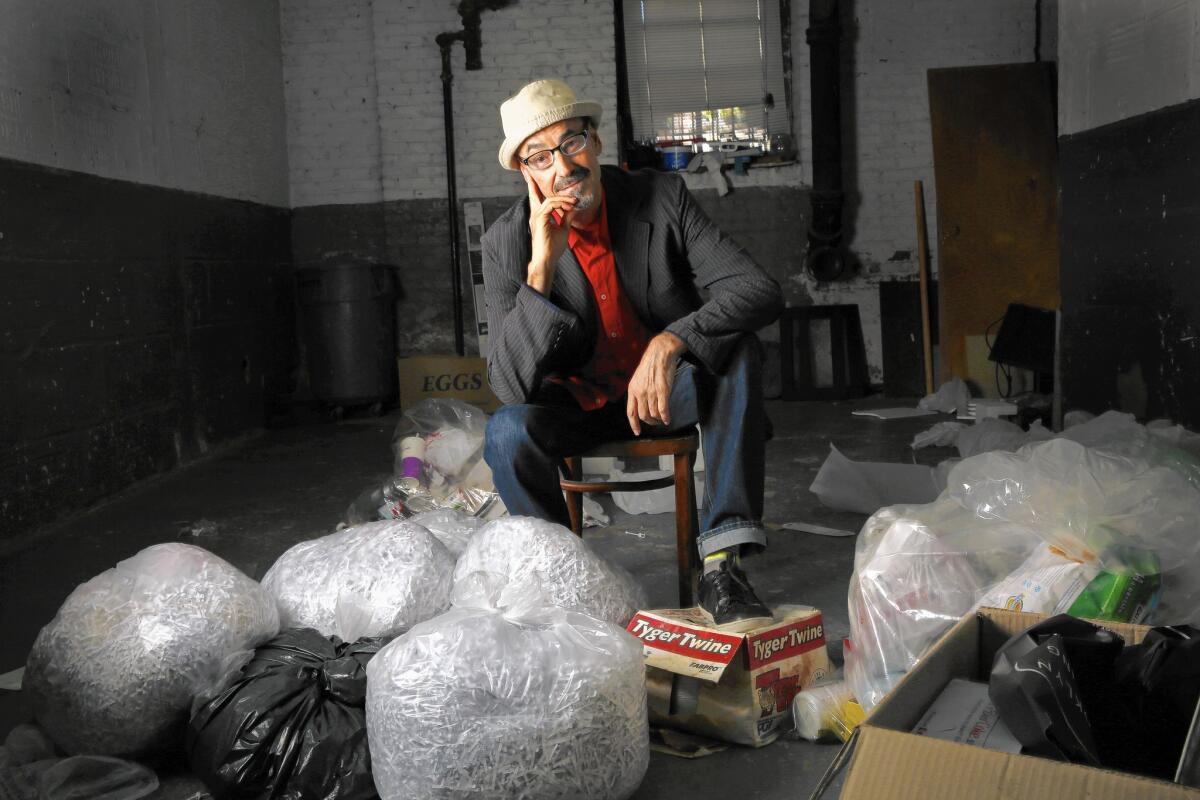Q&A: ‘Mess’ author straightens out readers about clutter and hoarding

With his new book “Mess: One Man’s Struggle to Clean Up His House and His Act,” Barry Yourgrau — he of many hats, including fiction writer, spoken-word artist, DJ and actor — has found a humorous way to look at the relatively new psychological condition known as hoarding disorder.
Chronicling Yourgrau’s effort to clean up his Queens apartment after years of neglect, “Mess” leads to a deep dive into the secret lives of hoarders and clutterers as well as Yourgrau’s own family history. The trip includes visits to multiple therapists and Clutterers Anonymous meetings, ride-alongs with experts like Ron “the Disaster Master” Alford and a brief history of hoarding, from the namesake pack rat (which charmingly stuffs debris into its hovel and then urinates on it) to noted clutterers such as Sigmund Freud, W.H. Auden and Roy Rogers. He discussed his project via e-mail.
Is your apartment still clean or have you slipped back into old habits?
“Functionally decluttered,” I call my apartment now. No more heaps of plastic bags and boxes. Dining table cleared and in use. My place feels sociable, not like a clogged lair. But I’m not a minimalist. I like my souvenirs and travel mementos and calendars and books — and displaying them. Please drop by sometime.
Are you — or can anyone be — “cured” of cluttering?
Cluttering — as opposed to hoarding — doesn’t involve a “cure.” It’s not an illness, unless it gets disabling. I’ve come to think it’s all a matter of personal style. Some people love many objects around, some people are very sentimental about things. Some people have more tolerance for dust. De gustibus. But as for hoarding, that’s a very difficult problem to solve. [It] takes huge patience. Clutterers can eventually let go; hoarders really can’t. That’s the crucial difference.
What was the one object you found most difficult to discard? How do you feel now about your decision to let it go?
The item I discarded that I miss most — as a melancholy pang, not as grief — was a natty burgundy-red cardigan that my then girlfriend gave me in L.A., right before she dumped me. I kept the thing for decades, even though it would tease back the memory of the nightmarish depression I crashed into after our breakup. But it also reminded me of how enchanting L.A. was to me, despite the heartache, when I lived out there in the late ‘80s, early ‘90s. That ambivalent pull of an object is part of the clutterbug and hoarder MO. But it’s also the way the heart works, no?
How important is it for hoarders to address the psychological underpinnings of their condition before cleaning up?
Addressing the psychological aspect is always essential, I’d say, as part of any cleaning up. Hoarding and clutter often become acute after trauma; the objects are a buffer against the pain. This was the case for me. So one needs to peel away oh-so-carefully. And people hang on to emotions as much as objects [and] are unable to face the pain of letting go of either. This is deep-rooted stuff.
What role can professional therapy play in the effort?
One of the astonishments for me doing the book was to discover how dominated the entire field of psychology is now by drugs and by cognitive-behavioral therapy, which is shorter term and focuses primarily on symptom relief. CBT is almost the sole therapy approach to hoarding — again, the condition is very resistant to treatment, whether it be talk or drugs, but guided peer groups do seem to offer the most help. And most of these CBT shrinks, even the most deeply empathetic ones I talked to, don’t seem to believe in the unconscious! They don’t make childhood primary. Which I find staggering. On the other hand, they make house calls. I can’t imagine any psychoanalyst visiting a hoarder at home.
Is the increasing attention being paid to hoarding (mostly via reality TV) actually helping people address their situations, or does it just serve as exploitation — or even enable hoarders who don’t think they’re “that bad”?
I think the hoarder reality shows are awful freak fests, I can’t bear to watch them. One of the leading hoarding psychologists, Dr. Sanjaya Saxena, refuses to appear as a TV expert any longer. On the other hand, another leading psychologist, Dr. Fugen Neziroglu, says that despite the sensationalism, the shows have increased public awareness. The TV documentary about the U.K.’s “most extreme” hoarder, Richard Wallace, was an exception. It treated Richard with much dignity, not as a shrieks-and-tears machine.
Was it important for you to find famous clutterers like [W.H.] Auden and infamous hoarders like Wallace to put your own situation in perspective? Did you ever worry that you were over-intellectualizing the situation as another way to distract yourself from the cleaning?
Not “over-intellectualizing” but rather getting consumed by the stories and delicious characters that emerged as I researched. As a fiction writer, this stuff was ambrosial. Plus I kept digging up jarring coincidences as I went along, and then unearthing some of my father’s real hidden story. So it felt sort of like I had set out to write about, say, trout-fishing and it had turned into my version of “Moby Dick.” Google really changed the way I researched.
Which contemporary writers or public figures do you think may be secret hoarders?
Gee, I don’t know. But doing the book I was startled to discover who had the proclivity. Ernest Hemingway, for instance, of all people, was a bona fide paper hoarder. He kept old Christmas cards, birthday cards, expired hunting licenses, what have you. I read a while back that Quentin Tarantino admitted he hung on to things relentlessly, wouldn’t throw things out, that if you had a magazine that you left at his place when you visited, it would be where you left it when you came back a year later. I wanted to talk with him about this for my book, but I couldn’t reach him. So if you’re reading this, Quentin, I’d love to talk.
More to Read
Sign up for our Book Club newsletter
Get the latest news, events and more from the Los Angeles Times Book Club, and help us get L.A. reading and talking.
You may occasionally receive promotional content from the Los Angeles Times.







